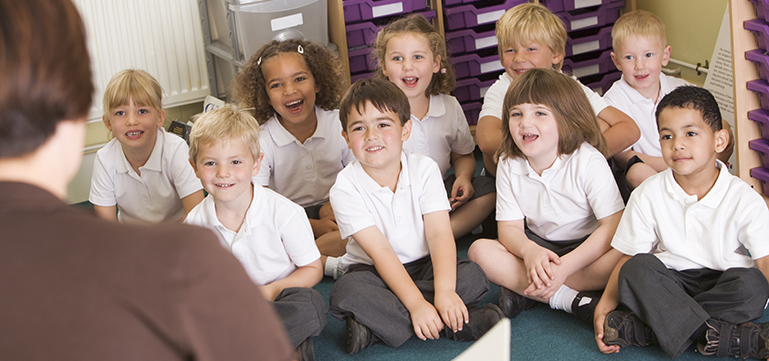An inclusive ethos and culture promotes effective pupil participation

Quick links:
Context
Hafod Primary School serves a former industrial area close to Swansea city centre. The school is located in a Communities First area, and most pupils live within the 20% most deprived areas of Wales. There are 233 pupils on roll, aged between 3 and 11 years. Around 30% of pupils are eligible for free school meals. This figure is higher than the national average of 19%.
Just over two-fifths of the pupils speak English as an additional language. There are 15 different languages spoken by pupils, the most common of which is Sylheti. A very few pupils speak some Welsh at home.
Culture and ethos
Leaders at all levels at Hafod Primary School promote an inclusive and caring ethos where everyone is valued. The way in which the school develops pupils’ understanding of their rights and responsibilities permeates every aspect of school life. As a result, pupils share their understanding about rights and responsibilities with their families in the local community and with schools across Swansea.
There is a very strong emphasis on celebrating difference and diversity through the curriculum, assemblies and the very colourful displays, which celebrate and enhance pupils’ learning. All pupils have equal access to the life and work of the school and leaders achieve this through clear policies, which show how the school engages pupils and the local community. Teachers and support staff promote the respect of each individual particularly well.
Action
The school has an innovative range of pupil voice groups such as the ‘caring crew’, the ‘health and safety squad’, the rights respecting group and the pupil participation group. Each committee has its own job descriptions and application forms.
All pupils experience regular opportunities to influence decision-making at the school. For example, every Thursday, representatives from the various pupil voice groups take suggestion boxes around the school ready for their meetings on the Friday. Group members then feed back to the rest of the school in the ‘golden assembly’ on Friday afternoons.
Every pupil in Year 6 is directly involved in a pupil participation group. As active members of the groups, older pupils contribute very effectively to decision-making and help to set the strategic direction of the school.
As a result, nearly all pupils are confident that the school listens to their views. These opportunities develop pupils’ self-confidence, self-esteem and speaking and listening skills.
Pupils take an active part in the school’s monitoring cycle and support the senior management team in evaluating the quality of teaching and learning across the school.
Members of the pupil participation group conduct joint lesson observations with staff and interview pupils. They identity strengths and areas for development and discuss these confidently with staff during feedback.
These pupils share the outcomes from the lesson observations with other pupils and governors. For example, during a cycle of lesson observations, pupils highlighted the need to develop opportunities for pupils to work more independently. Pupils write their own improvement plan in response to development areas that they identify and the governing body regularly monitors this. Pupils also evaluate the school development plan, contribute to policy development and produce a pupil prospectus for prospective new pupils.
Members of the pupil voice groups attend the first part of the termly governing body meeting and give presentations on their reviews. As a result, governing body members are well informed of pupils’ views on the quality of their learning experiences at Hafod Primary School.
Outcomes
The school’s values and rights-based approach to education has enabled it to provide a socially inclusive and rewarding school experience. The impact on individual pupils is that many pupils are highly motivated and take a greater responsibility for their own behaviour and learning.
Nearly all pupils value themselves, others and their environment. They have a thorough knowledge and understanding of their own rights and a respect for the rights of others.
Over time, nearly all pupils develop a greater sense of belonging to their school. As a result, whole-school attendance has improved and there have been no permanent or fixed-term exclusions for over three years. Almost all pupils enjoy their learning and sustain their concentration in lessons particularly well. Many pupils in key stage 2 speak confidently, for example when representing their peers on one of the pupil voice groups.
As a result of the focus on pupils’ rights and wellbeing, behaviour around school and in lessons is excellent. Pupils’ attendance has improved significantly from low baselines, and has been in the top 25% for the past three years, when compared with that of similar schools based on eligibility for free school meals.
Leaders have successfully reduced levels of persistent absenteeism, which are now very low. The local authority has shared this work with other schools, as an example of best practice.
The focus has also had a valuable impact on pupil outcomes. In key stage 2, at the expected level 4, pupils’ performance in all subjects shows an improving trend. Pupils’ performance in 2014 placed the school in the top 25% of similar schools for the core subject indicator, English, mathematics and science. In the Foundation Phase, pupils eligible for free school meals perform less well than their peers, but, by the end of key stage 2, these pupils perform as well as, and often better than, their peers.